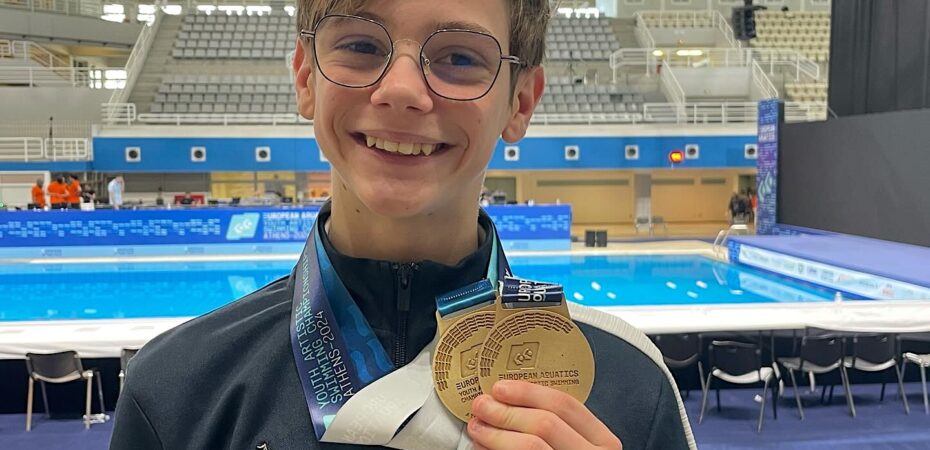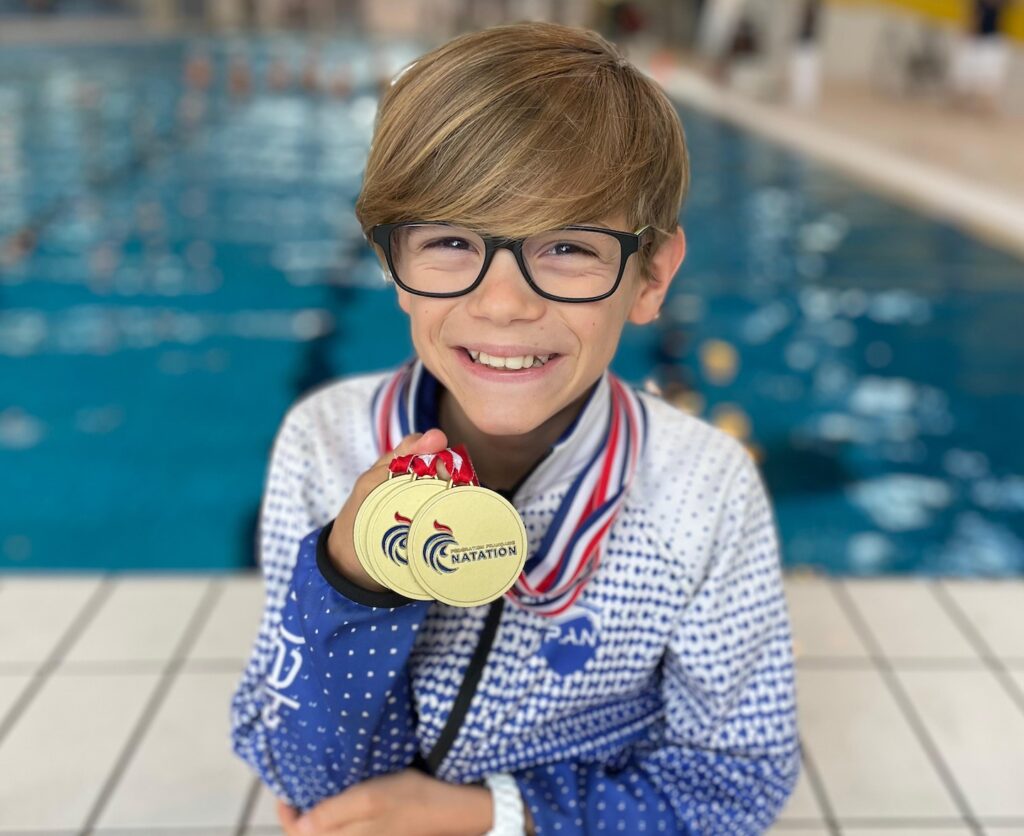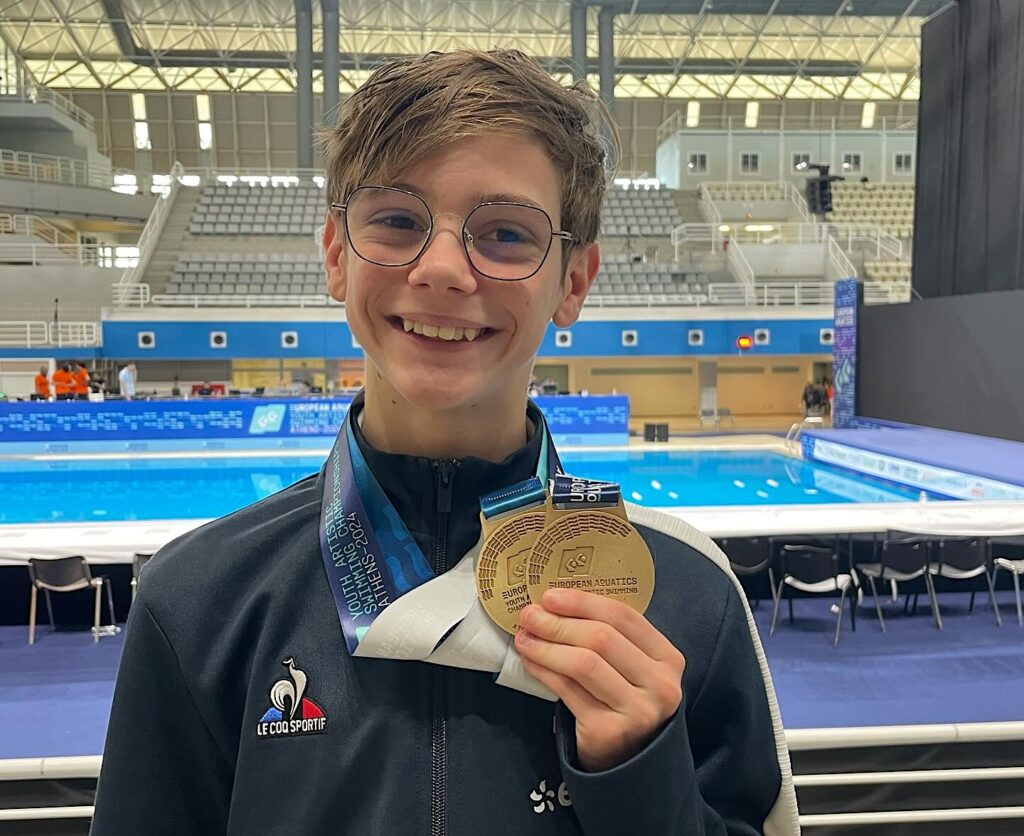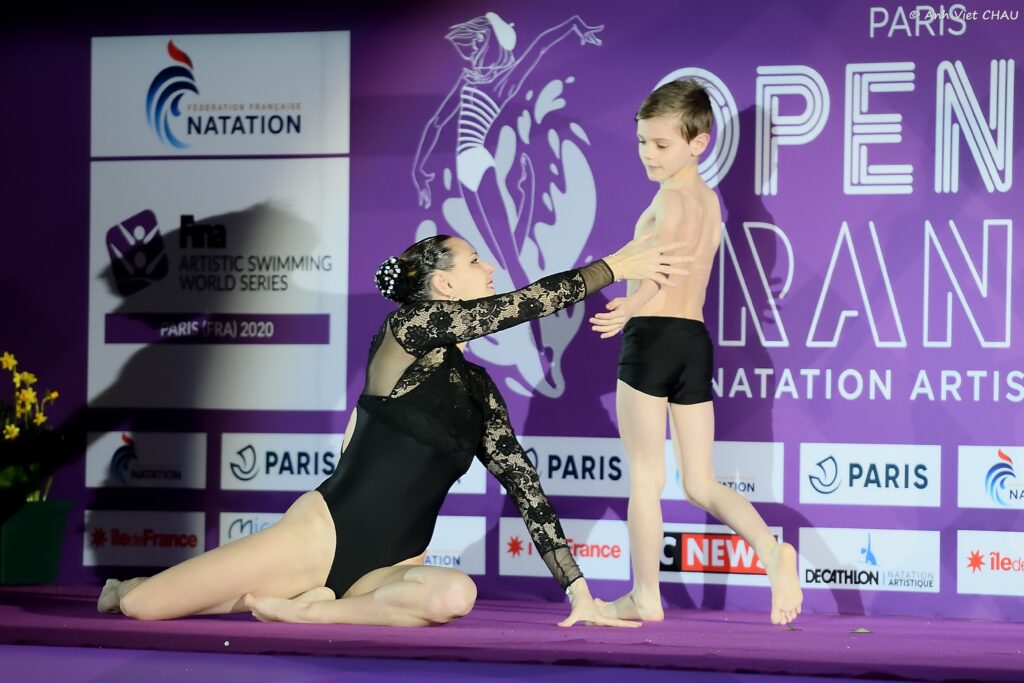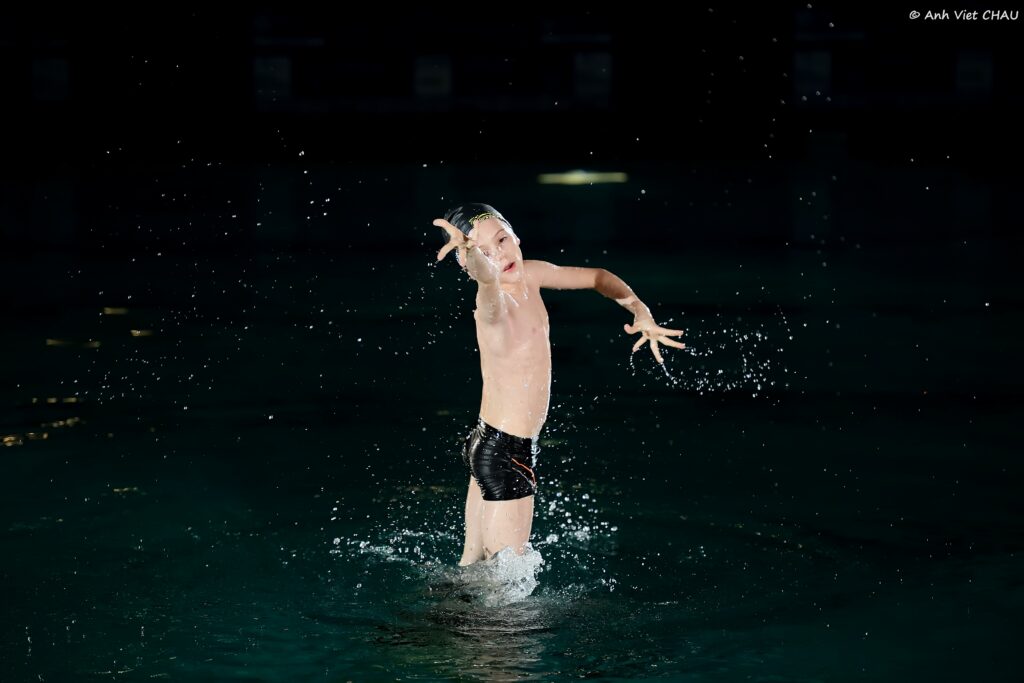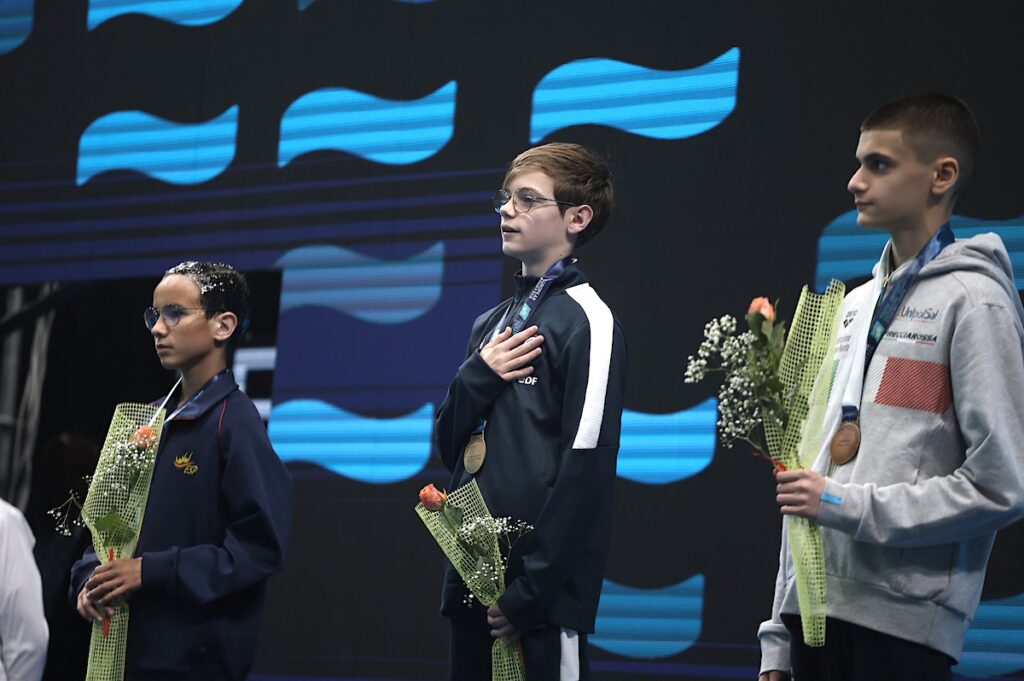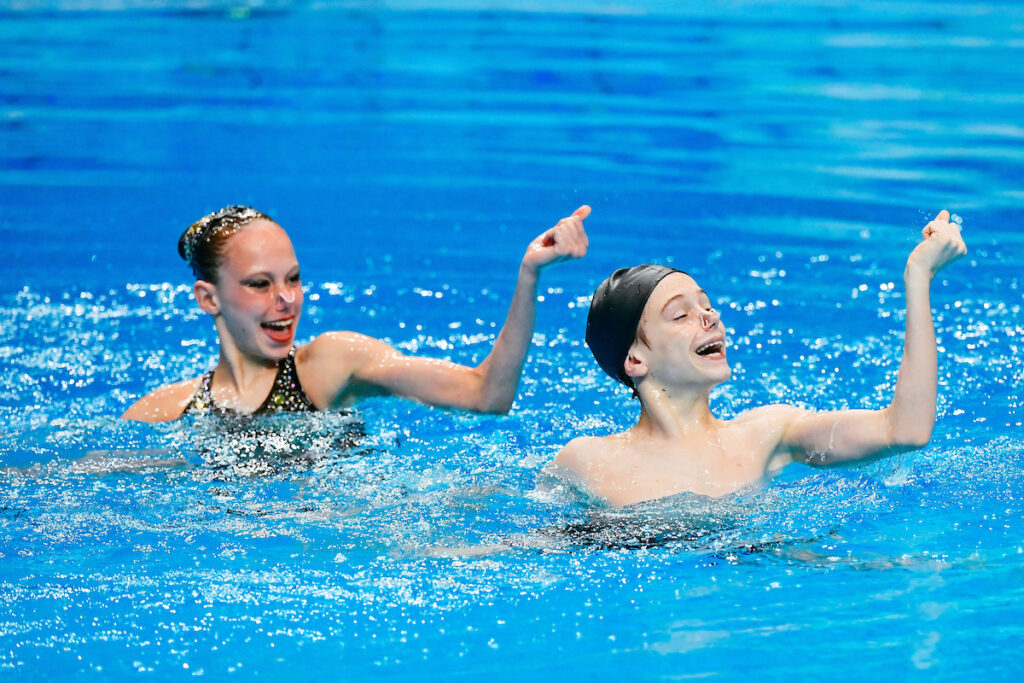At just 13 years old, Macéo Vanhée-Dedieu has made a remarkable entry onto the international scene. Last spring at the European Youth Championships (13-16 years old) in Athens, he won three medals: gold in solo, gold in figures in the boys’ category, and silver in mixed duet.
For many, it was a revelation. But for those who follow him more closely, it’s no coincidence. Since his first competitions in France in the Under-12 age group, Macéo has shown a lot of promise, impressing with his consistency, technical skills, and ease-of-movement in the water.
Macéo certainly grew up in an environment where artistic swimming was part of the décor. His mother, three-time solo World Champion Virginie Dedieu, made her mark on the history of the sport. Yet at home, she never forced his hand.
The young teenager has been going at his own pace, driven by an already highly personal artistic expression and a unique mother-son relationship, forged in the water. Today, this bond nurtures a dialogue and creative support behind the scenes. As for Macéo, he’s determined to write his own story.
His passion for artistic swimming was born, quite naturally, at the poolside. After seeing many of his mother’s shows, he too wanted to give it a try.
“I started when I was seven, but I wanted to start when I was five,” Macéo recalls. “Except that my parents didn’t want me to at first…”
“It’s not that we didn’t want to,” Virginie explains. “We wanted to make sure it was his choice, and that he didn’t just want to do like his mom. We also wanted him to be ready to face the remarks that this sport might entail for a boy. So for him to be sure of himself and of his choice could only strengthen him and give him confidence.”
Virginie and her husband Jeremie wanted their children to take part in sport, not for the competition, but for the values it brings to everyday life: the reward of hard work, sharing, open-mindedness, friendships, and balance. They encouraged their two sons to explore different activities in order to find what suited them best.
While the eldest preferred ball sports, Macéo’s attraction to artistic disciplines soon became apparent. As soon as he could walk, he danced. Even in the water, he moved in all directions, “just like me, actually,” Virginie recalls with a smile.
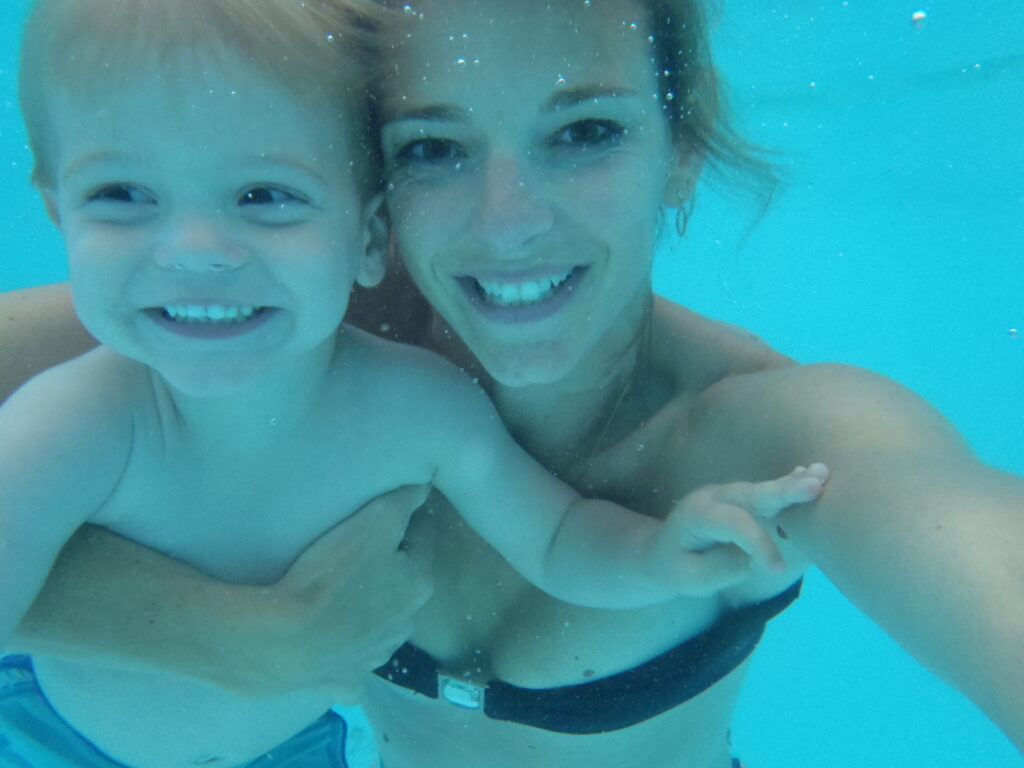
He took gymnastics, dance and even music lessons, but artistic swimming remained his first choice. So finally, after two years of careful consideration, he was given the green light.
“Unlike a lot of my mom friends who refused to let their daughters do synchro, I didn’t mind,” Virginie says. “I just wanted him to find his sport, where he was going to feel best.”
“Synchro helped me blossom as a person, so I don’t see why, if my kids like it, it wouldn’t do the same for them. It’s true that after I had my two boys, everyone told me, ‘That’s good, they won’t be doing synchro!’ I didn’t really think that way. But it’s true that I never imagined that one of them would choose it, especially as it really wasn’t common!”
Nonetheless from a very young age, Macéo has seen boys in artistic swimming. He was only four years old when Virginie started training again for the World Championships in 2015. The mixed duet event had just been added to the program, and she would once again be representing France alongside Benoît Beaufils.
A member of the Pays d’Aix Natation club, Macéo has been improving year after year, with his own ideas, his own aspirations, and a strong artistic curiosity. A true enthusiast, he watches a lot of videos, tries things out in the water, suggests different options, and asks a lot of questions.
“What I like is the artistry, the creation, the choice of music,” he explains. “For example, I can’t swim to music I don’t like, otherwise I won’t enjoy my routine.”
It seems it’s all in his blood: Musicality, fluidity, presence in the water, great lines… Qualities that are immediately noticeable, and not unlike those of Virginie.
His favorite solo from his mother? The one at the 2005 World Championships in Montreal, to Björk’s “It’s Oh So Quiet”. He watched it many times, in secret. In fact, Virginie had no idea and only recently found out.
But Macéo doesn’t limit himself to his maternal heritage. He is also inspired by Andrea Fuentes, Ona Carbonell, Aleksandr Maltsev, or even the U.S Olympic acrobatic team routine and the short training clips that American swimmer Anita Alvarez posts on social media.
While his mother provides TV commentary at World Cup events in France, he sits nearby, watching the warm-ups, filming the competition routines, and observing everything else the world’s elite has to offer at the time.
His favorite event to swim is the mixed duet, rather than solo or team, although he admits to liking lifts and acrobatics as well.
From the outset, Virginie has been called upon to choreograph his solo and mixed duet routines. Working with her son is a delicate equation, but one that works, combining the demands of the coach, the benevolence of the mother and the creativity of the artist.
“I’ve been coaching him a bit in spite of myself too,” she explains. “I am not his club coach by any means, and I don’t work with him daily. But I’ve indeed done all his choreography so far. Well, with him of course, because he does have lots of ideas (laughs)! So, naturally, when we are doing the choreography, I’m also going to give him a few tips and technical corrections. When he was younger, I very quickly taught him different kinds of movements, things he didn’t necessarily know how to do yet. He understood everything very quickly too.”
For several years now, Macéo and Virginie have also been sharing the pool at gala events for their club or in bigger competitions. Their first time in the water together on the international scene dates back to the 2020 World Cup in Paris.
Macéo was only eight years old and had barely over a year of artistic swimming under his belt. Despite this, they put together a small routine, with a long dance on deck, a short hybrid in the water, along with a few lifts and transitions. This first duet, simple and full of tenderness, was already a hit.
Over the seasons, their collaboration has become a true artistic dialogue. Now when son and mother share the pool, it’s like two artists answering each other, each with their own voice.
“What I really like is the creation and the research we do together beforehand,” Virginie says. “Especially now that he’s older, he’s suggesting a lot of things. We watch stuff, we test in the water, we listen to each other. When we’re swimming, we’re hyper-focused because we want to do well, so it’s really those moments of collaboration beforehand that I appreciate the most. It’s amazing to share that with him, especially because I know that soon enough, I’ll probably have fewer opportunities to do it!”
While Virginie’s international career has now been over for a decade, Macéo’s has only just begun. The 2024 European Youth Championships in Athens were his first time on the French national team. But on the eve of departure, everything almost came to an end.
During a final training session in Paris, he fell during the team routine’s deckwork, and was diagnosed with a fractured tailbone.
“I fell in the morning and in the afternoon, they told me: you can’t go, it’s too dangerous to fly, it could cause a lot of pain and make everything worse,” he recalls. “I cried a lot. I’d been thinking about this competition since the beginning of the year. It felt like all I did was for nothing…”
Especially as the diagnosis did not seem so clear-cut. Down in Aix-en-Provence, his parents sought a second opinion, but the departure for Athens was imminent. Finally, after several calls, counter-diagnoses and advice, the worst-case scenario was ruled out, and Macéo was allowed to at least travel to Greece.
As the days passed, his condition improved. Ultimately, the competition doctor confirmed that he could swim, but only solo, mixed duet and figures.
“I was so happy,” he says. “So in turn, I wasn’t too stressed during the competition. I told myself that it was already a miracle to be there, and that everything was just a bonus from then on!”
The “bonus” would be a hat-trick of medals, as well as another one as a reserve of the free combination routine, and a remarkable entry on the European scene.
“I don’t really remember how I felt when I heard the national anthem for the first time,” he says, laughing. “I’m not very emotional, so I didn’t cry. I think I was very happy and proud. And relieved, above all. Relieved just to have been able to go, because it wasn’t a given!”
For Virginie, these championships were also special as, for the first time, she wasn’t on the pool deck with her son.
Until then, she had been with him in a coaching role: focused on the task at hand and accompanying him up to the last minute. But this time, between the injury, the uncertainty of the travels, and the fact of being alone in the stands without the rest of her family, everything took on a different dimension.
“At the end of his solo, I broke down, it was the first time,” she said. “We didn’t even have the final results yet, but I think it was a whole. We’d just spent a complicated week trying to find out if he’d had a good diagnosis, if he could travel, let alone compete… And then, he had a great swim, so obviously it was a huge relief.”
While his competitors swam, Macéo met up with his mother in the bleachers. They found out together that Macéo had just become the new European Youth Champion.
“Besides, before the competition, I told him not to expect anything,” Virginie says. “This was his first year on the national team. We didn’t know the others, just as we didn’t know him. So I told him to just do his best and expect nothing. So, of course, when these results come in, you start telling yourself that there are more great things to come.”
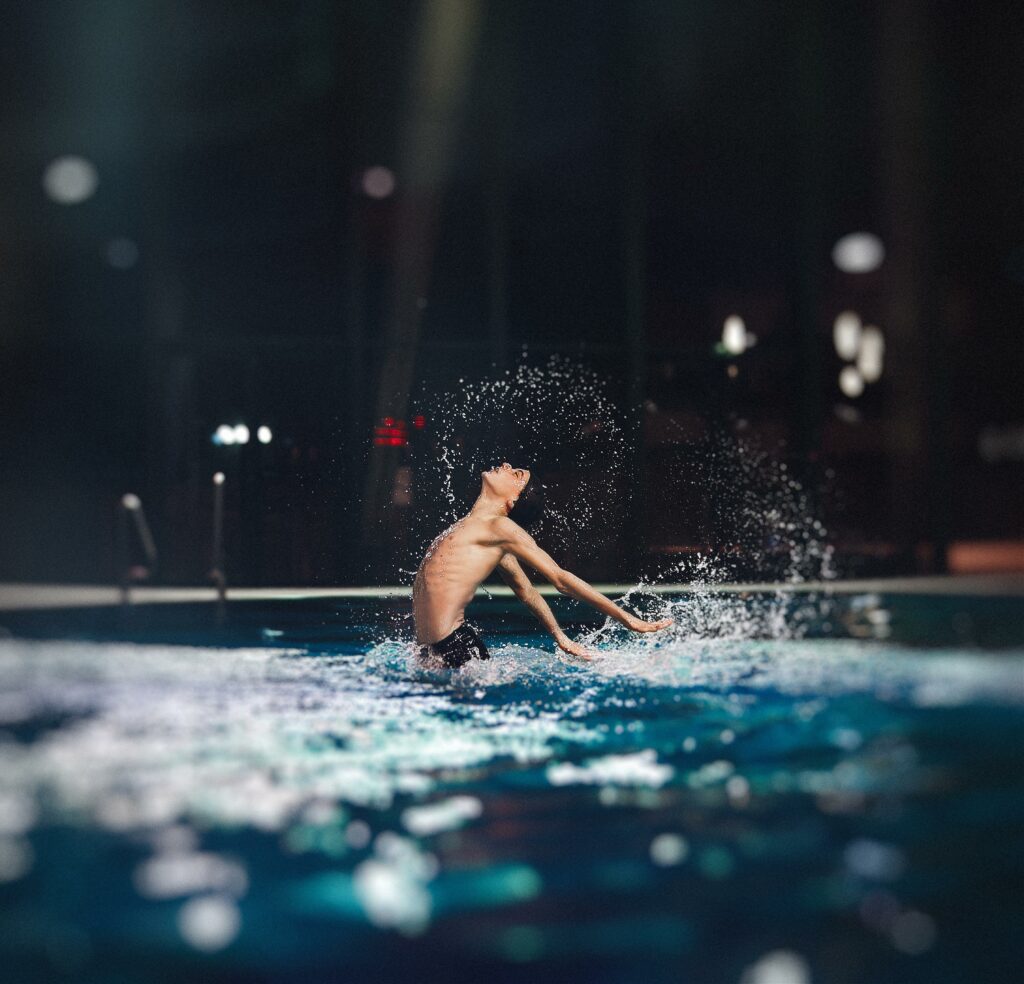
After a busy 2024 season, Macéo is now aiming for the COMEN Cup and the World Youth Championships, while continuing to juggle over 22 hours of training a week with his schooling.
His goals are clear: “to win medals.” And beyond that, he dreams of joining the INSEP training center in Paris, of the Olympic Games, and of all that elite sport has to offer.
For Virginie, the most important remains elsewhere: “Above all, I want him to enjoy it all, and to blossom. I think Macéo is an artist, so I hope he can go far in terms of creativity, that he can express himself as much as he wants, and that he can reach his full potential. If the Games are at the end of it all, so much the better. But I hope the sport brings him much more than that.”
In the end, what Virginie and Macéo share goes beyond the pool or the podium. Whether his journey leads to more medals or not, what matters most is already there: the joy of creating, the confidence to express himself, the space to grow, and the freedom to define himself on his own terms.
Whatever comes next, he’s already swimming in the right direction.
ARTICLE BY CHRISTINA MARMET
If you’ve enjoyed our coverage, please consider donating to Inside Synchro! Any amount helps us run the site and travel costs to cover meets during the season.

